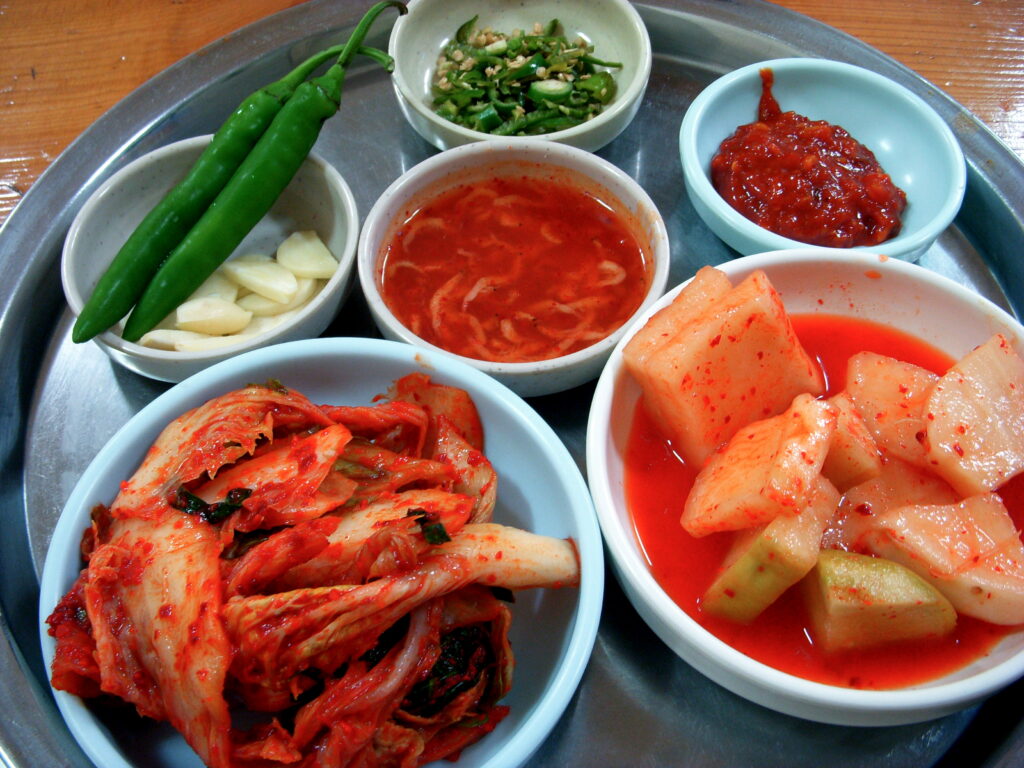Easy to Make Korean Food Recipes

The Health Benefits of Korean Cuisine: A Path to Weight Loss

Korean cuisine, with its vibrant flavors and diverse ingredients, is not only a delight to the taste buds but also a boon for health and weight management. Here’s why incorporating Korean food into your diet can be a game-changer for your health and weight loss journey.
1. Rich in Vegetables
Korean meals are often centered around a variety of vegetables. Dishes like bibimbap and kimchi are packed with nutrient-dense veggies that provide essential vitamins, minerals, and fiber. Fiber is crucial for weight loss as it helps you feel full longer, reducing overall calorie intake1.
2. Fermented Foods for Gut Health
Fermented foods like kimchi and doenjang (fermented soybean paste) are staples in Korean cuisine. These foods are rich in probiotics, which promote a healthy gut microbiome. A balanced gut can improve digestion and metabolism, aiding in weight loss1.
3. Low in Calories and Fat
Traditional Korean cooking methods such as grilling, steaming, and fermenting use minimal oil. This results in dishes that are lower in calories and unhealthy fats compared to many Western foods. For instance, samgyeopsal (grilled pork belly) is often enjoyed with lettuce wraps and a variety of vegetable sides, making it a balanced and lower-calorie meal option.

4. Balanced Meals
A typical Korean meal includes a balance of carbohydrates, proteins, and fats. Banchan (side dishes) often include a mix of vegetables, lean proteins like tofu or fish, and fermented foods. This balance helps maintain steady blood sugar levels and prevents overeating3.
5. Spicy Foods Boost Metabolism
Many Korean dishes are spiced with gochujang (red chili paste) and gochugaru (red chili flakes). Capsaicin, the compound that gives chili peppers their heat, has been shown to boost metabolism and increase fat burning4.
6. Portion Control
Korean meals are traditionally served with multiple small dishes, which encourages portion control. Eating smaller portions of a variety of foods can help prevent overeating and promote a more mindful eating experience5.
7. Hydration with Soups and Stews
Korean cuisine includes a variety of soups and stews like kimchi jjigae and doenjang jjigae. These dishes are not only filling but also help keep you hydrated, which is essential for overall health and can aid in weight loss by reducing hunger1.
Conclusion
Incorporating Korean food into your diet can offer numerous health benefits and support your weight loss goals. Its emphasis on vegetables, fermented foods, balanced meals, and mindful eating practices makes it a nutritious and delicious choice. So, why not give Korean cuisine a try and enjoy the journey to a healthier you?

#JavaBurnCoffee #WeightLossCoffee #HealthyLiving #CoffeeLover #WeightLossJourney #NaturalIngredients #BoostMetabolism #GuiltFreeIndulgence #RichAndSmooth #Results #SustainableWeightLoss #CaffeineFix #SayNoToCrashDiets #CoffeeForWeightLoss #TryItToday #InstaCoffee #LoseWeightTheTastyWay
Korean Cuisine: A Culinary Journey to Health and Wellness
Korean cuisine, renowned for its vibrant flavors and diverse ingredients, offers a culinary adventure that not only delights the taste buds but also promotes overall health and well-being. Here are some reasons why Korean food is considered a healthy choice:
- Abundance of Vegetables:
Korean cuisine places a strong emphasis on vegetables, which are incorporated into almost every meal. Vegetables such as leafy greens, root vegetables, and kimchi provide a rich source of vitamins, minerals, fiber, and antioxidants, essential for maintaining a healthy weight, reducing the risk of chronic diseases, and promoting digestive health.
- Fermented Foods:
Korean cuisine is famous for its fermented foods, such as kimchi, gochujang (red pepper paste), and doenjang (soybean paste). These fermented foods are rich in probiotics, beneficial bacteria that support gut health, boost immunity, and may aid in weight management.
- Lean Proteins:
Korean dishes often feature lean protein sources, such as fish, tofu, and lean cuts of meat. These proteins are essential for building and maintaining muscle mass, promoting satiety, and supporting overall health.
- Limited Processed Foods:
Traditional Korean cuisine emphasizes fresh, whole ingredients and limits the use of processed foods. This focus on unprocessed foods helps reduce the intake of unhealthy fats, added sugars, and preservatives, which can contribute to weight gain and other health issues.
- Variety and Balance:
Korean meals typically consist of a variety of dishes, including rice, soup, vegetables, and protein. This diversity ensures a balanced intake of nutrients and helps prevent overconsumption of any particular food group.
Healthy Korean Dishes to Try:
- Bibimbap: A colorful bowl of rice topped with vegetables, protein, and a fried egg.
- Tofu Stew (Sundubu Jjigae): A spicy and flavorful stew made with soft tofu, vegetables, and seafood or meat.
- Bulgogi: Thinly sliced marinated beef or pork grilled and served with vegetables.
- Samgyeopsal (Pork Belly): Grilled pork belly often paired with lettuce wraps and various dipping sauces.
- Kimchi Pancakes (Kimchi Jeon): Crispy pancakes made with kimchi, flour, and vegetables.
Tips for Making Korean Food Healthier:
- Choose lean protein sources and limit processed meats.
- Opt for brown rice over white rice for added fiber.
- Use less oil when cooking and opt for healthier cooking methods like steaming or grilling.
- Make your own kimchi or choose low-sodium varieties.
- Go easy on the spicy sauces and condiments.
Embracing Korean cuisine can be a delicious and nutritious way to support your overall health and well-being. By incorporating a variety of healthy Korean dishes into your diet, you can enjoy the vibrant flavors of this culinary tradition while reaping its health benefits.
